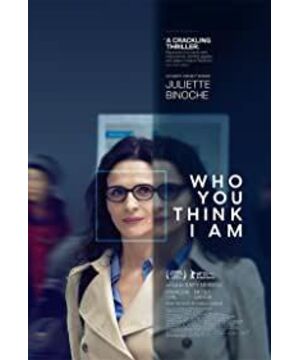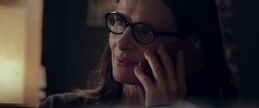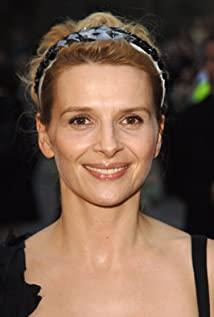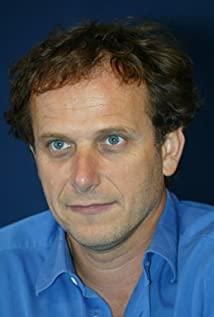Binoche is my favorite actress. It's just that even the most talented actors can't escape the choice of roles. When she was young, she starred in "Lovers in the New Bridge" and later played Camille Claudel, all of which needed to destroy the glamorous appearance and show a woman's most crumbling and dignified side, although it was also a bit distressing. , but not yet in the new film "Who Do You Think I Am" that made me feel so deeply hurt. In this film, Binoche needs to play a 50-year-old divorced woman who desires sex. In order to get close to the young man Chris, he uses his niece's face as his image in the fictional cyberspace, and Chris "online dating" ".
This is not a perfect script. Is Binoche playing the role of Claire, is it a harm or a gift to the fans? Why do I have the experience of hurting and being gifted at the same time?
The movie seems to be discussing the issue of online dating, but if it's just an issue of online dating, this movie is too outdated. The Internet is an ancient concept, and online dating is a thing of the past. The film is about another theme: in the ever-changing modernity, will an aging woman be excluded from the erotic market?
At the beginning of the film, Claire has a constant sexual partner, and he is very young. They know each other what kind of relationship it is. Can a literature teacher and a woman who does not worry about making a living exchange the sex she wants as she pleases? Like any man in her position? the answer is negative. When there was no sign and no contradiction, the little boyfriend proposed to break up because he was just tired of playing. And without hesitation satirizes Claire's aging. But Claire had to hold back this shame and continue to keep it, because she knew very well that this superficial relationship, even though it was nothing, had become her greatest consolation.
By chance, she met Chris, a good friend of her ex-boyfriend, and approached her intentionally. They tried the only way to have sex without seeing each other: phone sex, and the relationship deepened. However, her name, age, and photos were all fake. The film did a control experiment for the meeting Chris requested: In the first case, at the train station, Claire still did not have the courage to expose herself, and then cut off with Chris After a long time, Claire learned from her ex-boyfriend that Chris committed suicide by jumping off a cliff because of lovelorn and depression; in the second case, Claire and Chris had a cordial conversation on the bus, but did not tell each other that she was the one on the network, Chris falls in love with the real Claire, and Claire increasingly suspects that he is just using himself to relieve the pain of broken love. One day, Chris finds out the truth. Painful and angry, before their confrontation, Claire dies in a car accident; the third situation , they did not meet, and Chris soon came out, married another woman and had a child, leaving Claire alone to reminisce.
This controlled experiment is also an exploration of the possibilities of life for women in Claire's situation. The film uses "Facebook" as a carrier, not only the meaning of the Internet, but a metaphor for the entire modern world. 2019 is the year of the outbreak of the new crown. The further development of life science and data intelligence has further turned the mysterious side of human life into some kind of objectivity. We are becoming more and more aware of the fact that human beings, as a reality, have embraced the "inevitable choice" of replacing human labor by machines without thinking, but few people see that more and more living people are about to be excluded from the entire system. Outside: the elderly, the poor, and, women. Claire's hesitation about "meeting" is precisely because modern technology has made real emotional communication a distant past. She is very clear that the "meeting" that Chris asked for is just "inspection" and has no emotional value. An option that is as dangerous and easy as placing an order on a shopping app. Choices will become increasingly convenient, low-cost, and instant, while once-cherished universal values are buried alongside outdated means of communication. The movie is interesting, it asks: Will women benefit from this system? Chris is unemployed and low-educated, but young and easily in a state of choice; Claire is a brilliant female professor on the podium, but she is old, and she cannot hook up with today's young people by uploading real photos. Today we may be concerned about a hindrance to the lives of the elderly by modern technology, but few people will find or admit that men are more likely to benefit from most technological advances than women.
In the process of checking her gender - writing her name - hobbies..., a 50-year-old woman used Facebook for the first time to build intimacy, which at first seemed easy, not at all difficult for a female professor , and then she learned to like and network language, but the myth of technology was shattered when this invisibility was threatened, and she was asked to return to the male "inspection" perspective, which had nothing to do with whether she would use modern technology or not. . As a woman, it is difficult to stand on the same advantages. When Claire gave a lecture in front of many students, she told her views on works and writers. Based on her knowledge and experience, the world in front of her was concrete. , safe, she was a beloved observer, but when she stepped back in front of a man who didn't have much knowledge or experience to grasp her, she suddenly lost that objective perspective , to use a popular term, she could not equivalently de-objectify men, calling men objects, as men can do to women. This is the side that modernity tries to cover up. People always believe that technology can help us move closer to all kinds of equality; an epidemic tells us that this is not the case. The pattern, technology can do nothing about it. It is important to note that technology is not neutral. It should be responsible for this outcome that does not lead to inevitable progress.
In the case of the first controlled trial, Claire felt guilty and chose to write. This viewpoint is interesting. Because it naturally associates women with writing. Many years ago, when I first got to know Binoche, I watched Kieslowski's "Blue", where she played a musician who is also the widow of a male musician. In "Blue," Binoche keeps losing: her husband dies in a car accident, her husband's mistress appears, etc., but is finally freed, and in the process of continuing to compose the unfinished music of her husband's life, she writes for her own This freedom seeks a way out, and freedom is related to creation; but in this film, on the contrary, Claire is also facing loss: her boyfriend broke up, and the online dating relationship is on the verge of ending... But as the time to "meet" approached, She lost her freedom step by step, so she chose to write, the second possibility of writing the story. It's just that the writing of this version is based on the nostalgia for love and the nostalgia for loss, so it is bound to fail. The third possibility - I think, that is, the real life itself - wrote her down effortlessly. The story is completely negative. If you delve into the relationship between women and creation and writing a little bit, you will find that the "freedom of creation after losing talent" provided by "Blue" and "the meaning of life ultimately dissolves freedom" provided by "Who Do You Think I Am" are both attempts to A kind of spiritual inquiry to women in different eras: Do you want to write? Will you keep creating? For example, Xiao Hong uses her life’s loss (including active loss) to find footnotes for her freedom of writing. Women’s writing seems to be premised on being deprived of everything: love, marriage, and even children, rather than having everything (pounds, rooms?). At the moment when all objectivity has vanished into nothingness, women can make a dull and clear voice from the depths of the body.
After I watched the film, it suddenly occurred to me that this character was only brought to life by Binoche. I'm reminded of her class scene in the film, about Marguerite Duras, in Duras's classic, feminine eroticism of the last century, we often use the guise of men to gain a perspective on The illusion of change; could there be a more modern version of writing by women such as Duras? What kind of connection does this have with technology, with religion, and with class? I believe that more women must be relied upon to give sustained attention, and even leadership, to discussions on these issues. It will never be possible to obtain male positions and male visual positions alone.
View more about Who You Think I Am reviews











